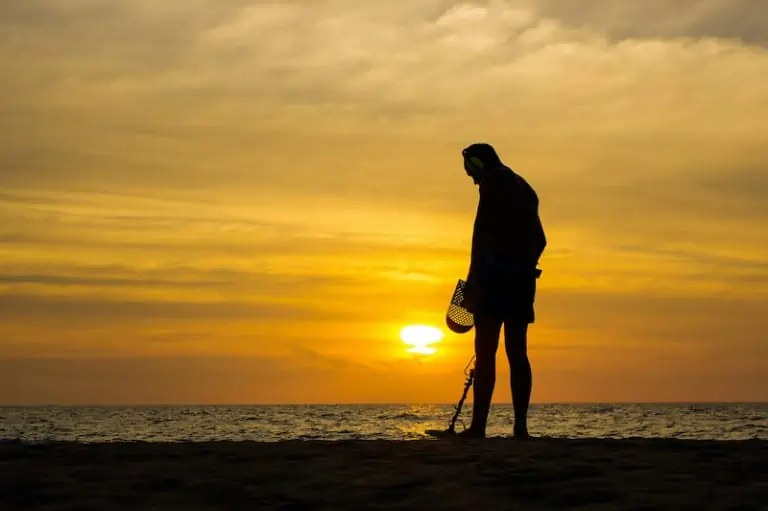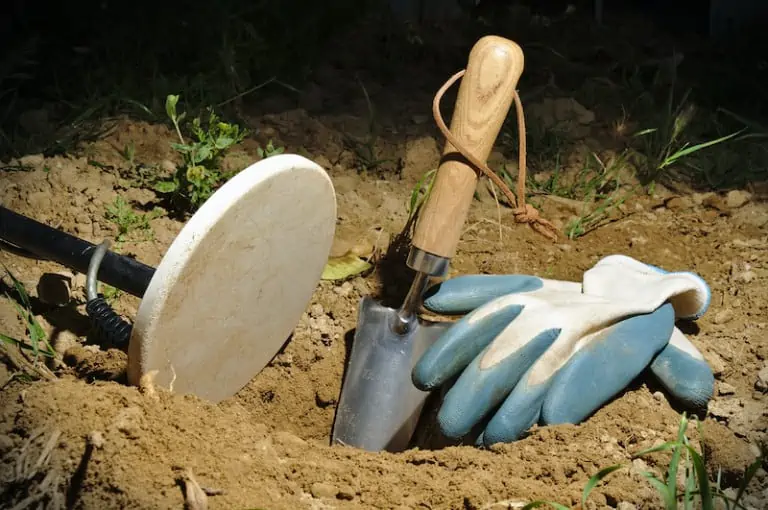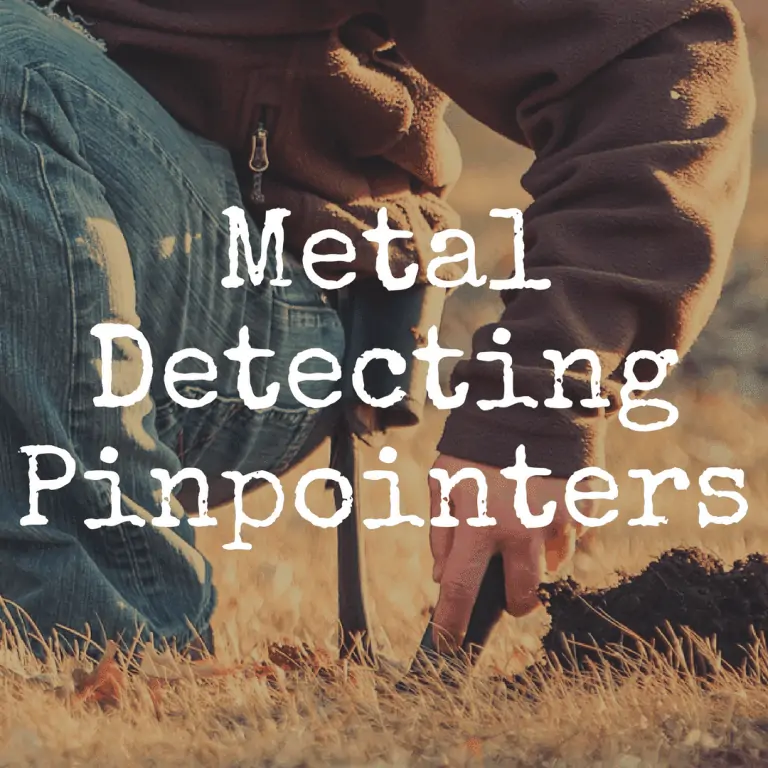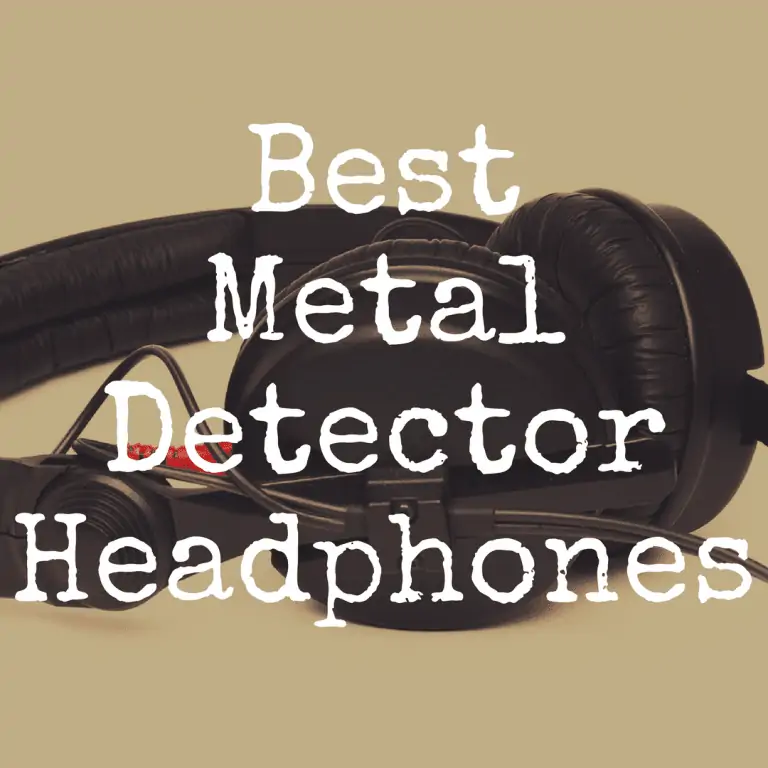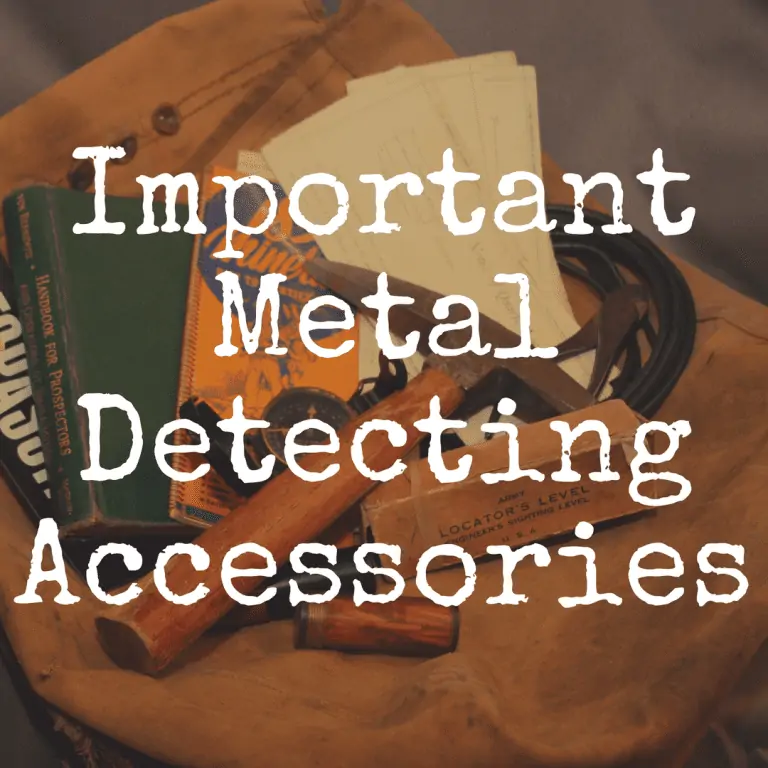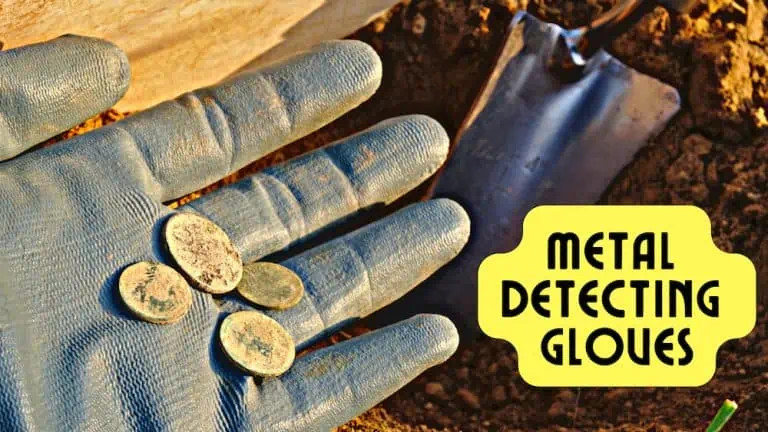40 Metal Detecting Must Haves to Pack with You
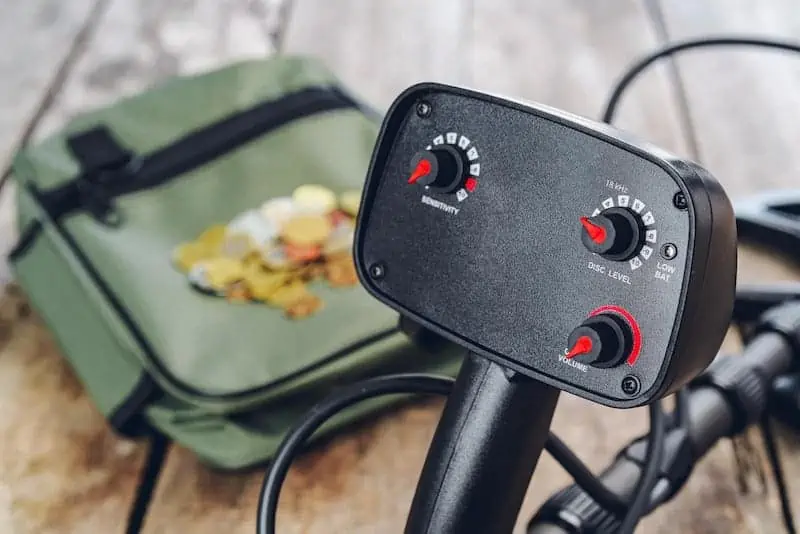
In this article, I’m going to cover 40 can’t miss things to pack with you for your next metal detecting treasure hunt.
So sit down, relax, and enjoy my metal detecting must haves list!
1) Get the Detector You Need
The right metal detector for your area, type of treasure, and budget is very important for all detectorists. You don’t have to start out with a $1,000 detector. Many fantastic models are well under this price and work extremely well. Once you have researched your area and know what type of treasure you are looking for, you can choose the proper metal detector.
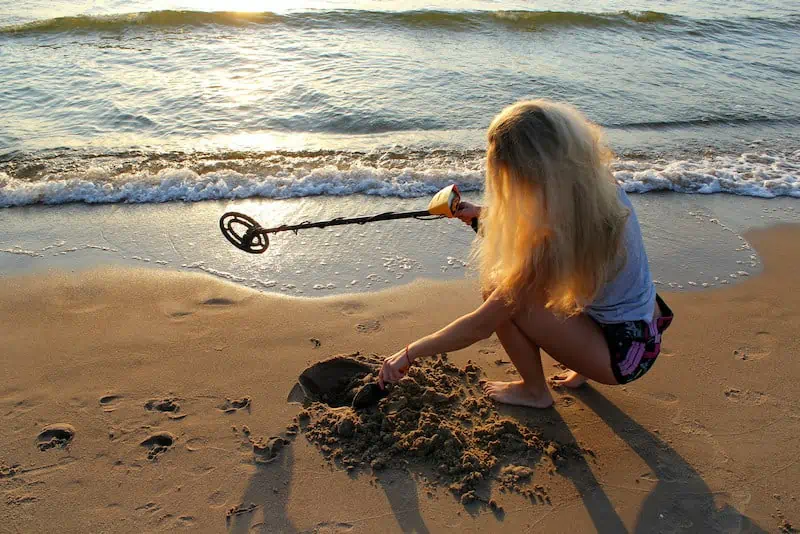
I live in the western United States and my area is full of gold, silver, coins, and relics. Because of the mining activity and mineral content of the soil, I rely on a detector with very good ground balancing to cancel out the minerals in the soil.
If I use a detector with poor ground balancing, I get a lot of detector chatter and overloads. You can choose either a very low frequency (VLF) metal detector or a pulse induction (PI) metal detector.
Major metal detector manufacturers make detectors specifically for certain soils and certain treasures. Each has their merits, and each has great features for beginners and advanced detectorists.
2) Do Proper Research
This may seem like an odd thing to “pack” with you on a metal detecting trip, but trust me, it is the most important thing you will have.

Doing research will save you time and energy. If you have already researched the area you will be detecting, you will have a good idea of what type of treasures are common in your area, what types of mining activity or human activity have taken place, the locations of old homesteads, and a lot of other important history.
Knowing these things will make your trip more successful and more fun for you. You will be able to just focus on your detecting and not worry about whether you are in the right area or not.
3) A Good Quality Pinpointer
A good metal detecting pinpointer is a great tool for all detectorists. When you find a target with your metal detector, you can pull out your pinpointer and more accurately find the target.
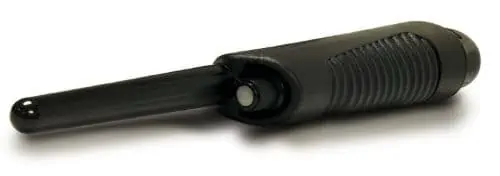
You also don’t need to dig as large a hole when using a pinpointer. Most metal detectors have a pinpoint mode, but a handheld device is more accurate and requires less digging.
4) A Quality Shovel
I have personally made the mistake of using a cheap shovel while metal detecting in the woods. It sure puts a halt on a metal detecting trip when your main digging tool breaks.
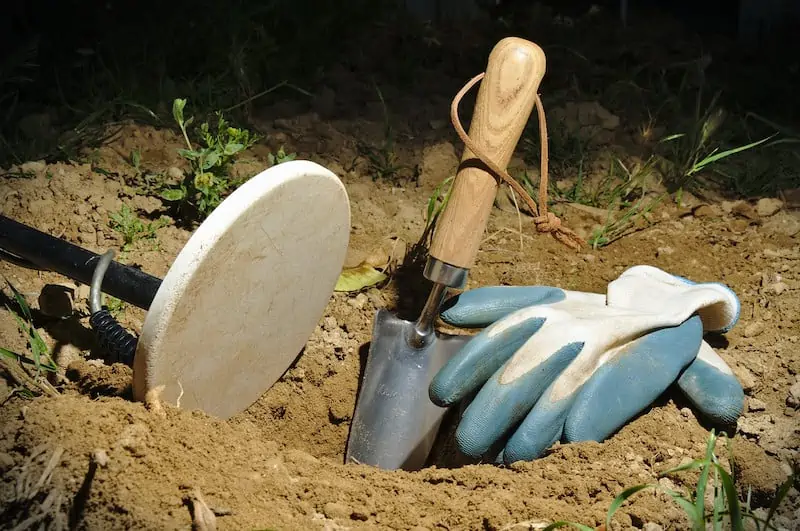
A full-sized, high-quality shovel is a must have for detectorists, especially when you are working in highly compacted soils. Metal detecting diggers typically come with one serrated edge, double serrated edges, or blade only edges. Each works well for different conditions.
5) A Handheld Shovel
For softer soils, a handheld shovel works extremely well. It also helps you dig smaller holes. Some detectorists like a handheld shovel with serrated edges as they cut through the soil easier.
They also make it easier to dig a good grass plug when digging in yards or parks. Everyone appreciates it when you put your plugs back properly!
6) Sand Scoop
If you plan to detect on a beach, a sand scoop is a must. It is very difficult to dig a decent hole in dry sand. A sand scoop will do just what it says: scoop the sand while leaving the target inside.
These scoops have holes all around the outside so the sand can escape while the target stays behind. These scoops come in short, medium, or long handle. Long handled scoops work very well for scooping wet sand underwater. Short or medium handled scoops work well for dry sand.
7) A Rock Pick
This is not a necessity in all situations, but depending on the area, a rock pick comes in very handy. As I mentioned, the areas I usually metal detect are known for producing gold and silver.
Sometimes the ore is still inside rock or is between rocks. A good rock pick helps when prospecting. These can also help break up difficult soils or cut through tree roots when detecting in the woods.
8) Extra Batteries
I always bring several extra batteries with me when on a detecting trip. Several conditions can make your detector’s batteries die quicker and it is a good idea to have at least one extra set of batteries. Most detectors run on AA or 9-volt batteries.
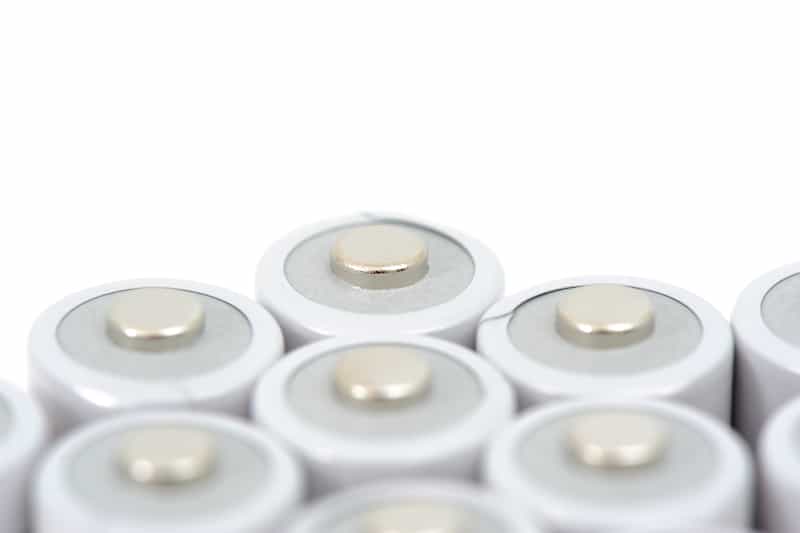
Some models have rechargeable battery packs along with standard battery pack backups. If your machine uses rechargeable battery packs, ensure the detector is fully charged before you leave and bring extra batteries for the backup power supply.
9) Extra Coils
Certain metal detectors have interchangeable search coils. It can be very helpful to have different sizes and types of search coils when on a metal detecting trip. Some areas will yield better results with a concentric coil while others will yield better results with a Double-D coil.
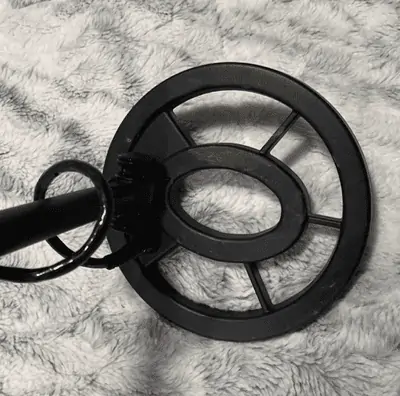
These are the 2 most common types of search coils. The size of coils is important, too. Larger coils will cover more ground, but smaller coils are more accurate. If you will be hunting in a river, stream, or beach area, make sure your search coil is waterproof.
10) Coil Covers
Coil covers are great for rugged, arid search areas. When you are in these areas, your search coil can become damaged and scratched. Having a coil cover ensures the coil stays in pristine condition.
These covers are thin enough they do not hamper depth or sensitivity. You may even have a bit more depth and sensitivity since you can have the detector coil right on the ground with a cover.
11) Flashlight
I always recommend taking a flashlight when metal detecting. This can help you see better in shaded areas, or in low-light conditions.
Sometimes the flashlight will pick up a small glint that you are unable to see and help you find the targets easier. I like to have a tactical style flashlight that is waterproof and rugged in case I drop it.
12) Finds Pouch
Having a finds pouch keeps your treasures safe. While you could put them in a backpack or pocket, the finds pouch is more easily accessible as they are usually belt mounted. It can be cumbersome to remove your backpack or to shove larger target items into pockets.
If you will be searching underwater, a mesh pouch is recommended as the water can flow out while keeping the loot inside and they usually have drawstrings on top to keep your items inside.
13) Delicate Finds Case
It is possible while metal detecting you will come across a delicate relic of some kind.
For this reason, I recommend keeping a case specifically for delicate items in your pack. I like to use a plastic container with rags or cotton inside to keep the items from moving around.
14) Bag to Keep Trash in
There is no way around it: when you metal detect you will find plenty of trash. As detectorists, we try to leave an area better than we found it.
To that end, pack out any trash you find (unless it’s extremely large or dangerous). I keep a separate bag for trash items, so I don’t have to keep them with my good finds in the pouch.
15) Detector Bag
A good metal detector bag is a necessity. It not only keeps your metal detector safe, but it keeps all your things together. The bag I use is large enough to keep my detector and one of my kids’ metal detectors inside, as well as a pinpointer and a few smaller items.
The detectors must be broken down, so we only use this bag for transport, typically. But there are larger bags that allow your detector to remain fully assembled inside.
16) Tarp or Cloth
If you are metal detecting anywhere besides the woods, you will need a cloth, tarp, or even a frisbee or dish to keep the dirt you dig in. This way you can refill the holes properly.
It is important to always fill the holes you dig completely. In yards or parks, you must ensure the holes are filled in, so keeping a tarp or cloth around allows all the dirt to be kept there until you finish digging. It is easier than trying to scrap the dirt out of the grass back into the hole.
17) Backpack
Especially when hunting in the woods, I like to use a backpack. When that far away from home, I like to take more items with me than I do for trips to local parks or yards.
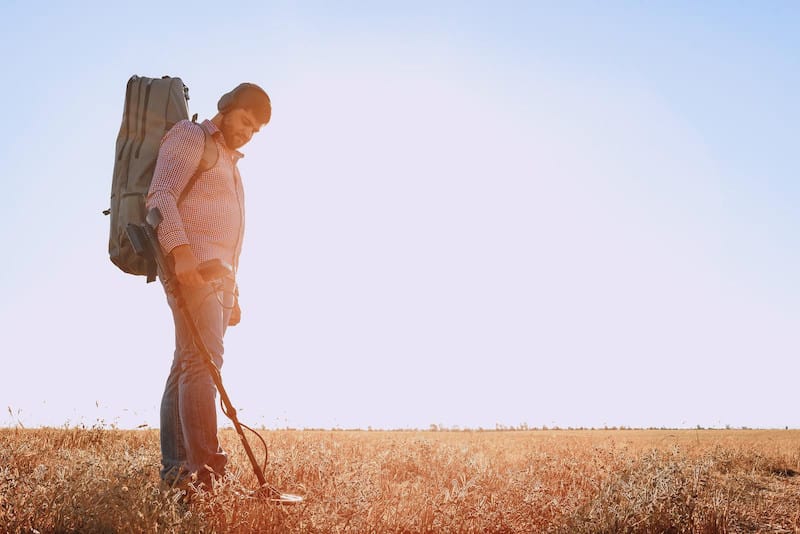
I like to use a rugged backpack to keep all my smaller gear and extra accessories and items in while detecting. I don’t wear it all the time, but it can be left nearby and picked up when moving on to another location.
18) Water
Water is one of the most important items to bring with you on any metal detecting trip, but especially in the woods or desert. A lot of metal detecting takes place during the warmer months of the year, and it is easy to get dehydrated.
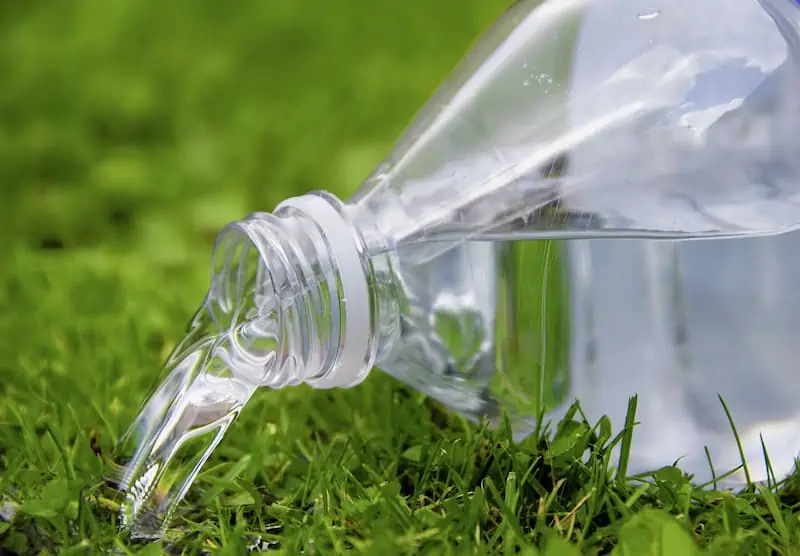
Even in the wintertime you can get dehydrated quickly when outside. Always keep some extra water in your backpack or holster to keep you hydrated.
19) Snacks
If you will be metal detecting for long periods of time or are on a camping trip, bring some snacks with you. If you start to feel sluggish a snack can help boost your energy.
You can also bring along a sack lunch to keep you going. This will give you a good rest while you eat then you can get back out there and find more treasures.
20) A Hat
A hat can help you keep the sun out of your face when metal detecting. If you have long hair like me, it also helps keep your hair out of your face.
21) Proper Shoes
It is important to wear the proper shoes for the environment you will be hunting in. If you will be hunting in the woods, good hiking shoes should be worn. If you are on the beach, feel free to wear flip flops or go bare foot!
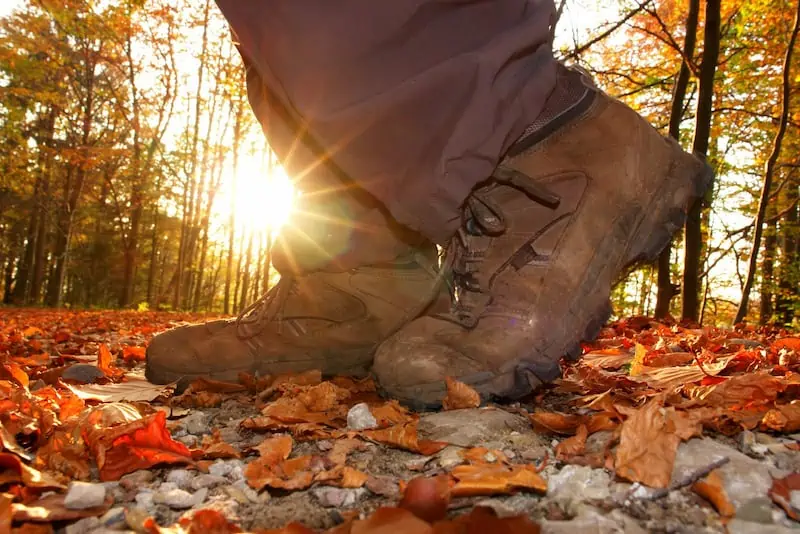
If you know you will be walking through rivers or streams, make sure your shoes have excellent traction. River rocks are slimy and slippery. Not only will you go down if you slip but your metal detector could be broken or water damaged (if it’s not waterproof).
22) Proper Clothing
Always wear the proper metal detecting clothing for the time of year and environment you are searching in. I like to keep a jacket or sweatshirt in my backpack in case the weather turns, or it gets dark.
I also like to keep a pair of dry socks in case my feet get wet. Wet socks are awful and distracting and can be dangerous if the weather is too cold. If it looks like rain, make sure to take a raincoat so you don’t get completely soaked.
23) Gloves
Gloves can help keep your hands clean and safe. When digging, especially in rocky areas, you may scratch your hands. Make sure the gloves are thin and don’t hamper your range of motion.
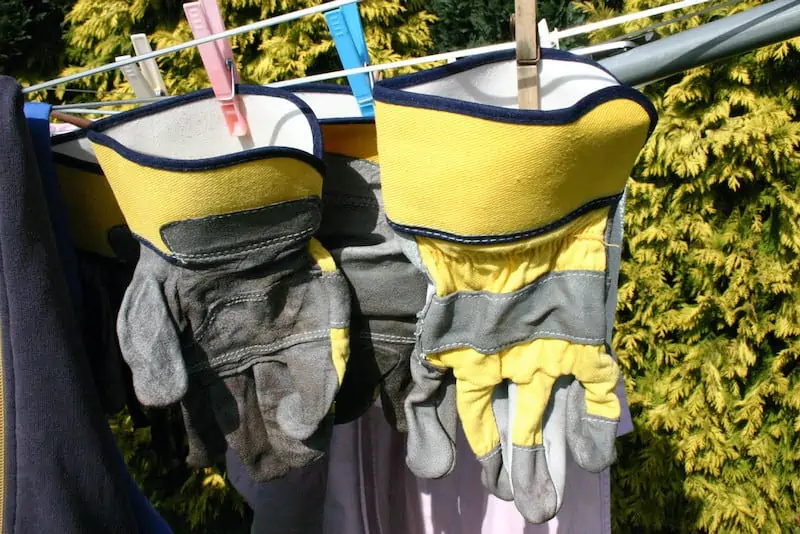
Regular garden gloves are the cheapest option, but more tactical style gloves are more durable. It is up to the user what type of gloves work best for them. I usually keep a couple of pairs of gloves in my pack in case one set gets torn or wet.
24) A Map
Especially when hunting in remote areas, always bring a paper map. There is a chance you may not have cell phone service and shouldn’t rely on that to be your only map.
Charting your course on a paper map can keep you from getting lost and help you find your way back safely.
25) GPS Device
A GPS device can be helpful in remote areas. You can chart your course as you would on a paper map, and can also mark the coordinates of your camp, vehicle, and any important finds or areas of interest.
Make sure the batteries in the device are fully charged and bring spares if it requires non-rechargeable batteries.
26) Your Cell Phone
Even if you are in an area with spotty or no service, keep your cell phone on you. Be aware that cell phones can interfere with metal detectors due to electromagnetic interference.

You may need to turn it off while detecting. In cases of emergences, keeping your cell phone on you is important. Especially if you can walk or drive to an area with service.
27) Bug Spray
If you are detecting in the warmer months, you will absolutely want bug spray when hunting by water. Some areas are more prone to mosquitos and other pests.
Keeping bug spray will keep them out of your face and keep them from stinging or biting you. Mosquitos are not only obnoxious, but they can spread diseases. Bug spray will help keep them away.
28) Sunblock
If you will be hunting in the daytime hours, you should wear sunblock. It doesn’t matter the time of year or if its sunny or cloudy. You can get sunburned in any condition and should protect your skin.
There are many types of sunblock for many types of skin and different SPFs. Choose the one that is right for you and keep it in your pack. Reapply often, especially if you are in water or perspiring.
29) Headphones
In certain areas, I recommend using metal detecting headphones to search. Headphones can help you hear faint signals that may be missed using the external speaker. They can also keep your detector sounds quiet if you are searching in an area with other people around like a beach or park.
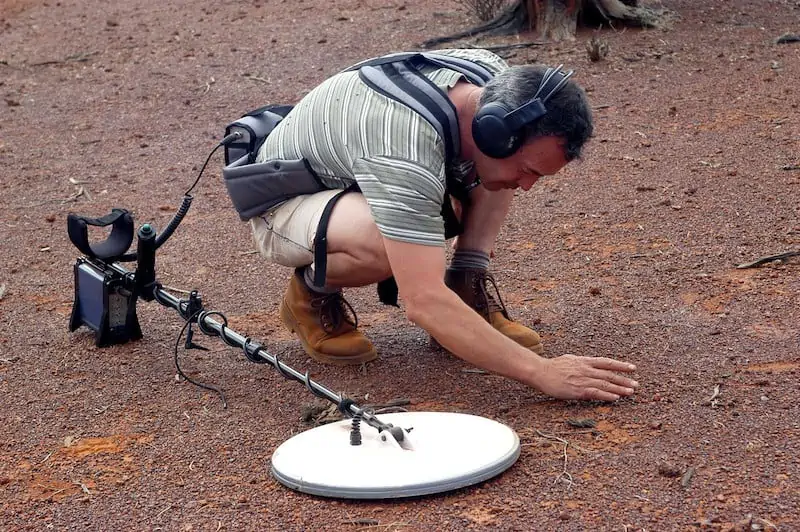
Always be sure the area is safe for you to wear headphones. When in the woods, I don’t recommend using headphones because you always need to remain aware of your surroundings. If you are in a city or town, you can safely use headphones.
30) Magnet
Taking along a neodymium magnet can help you separate trash from treasure. Most ferrous metals are magnetic and nonferrous metals are not. Because a lot of my metal detecting takes place in the woods, there are a lot of bullet casings and other trash items.
Using a magnet before I start searching helps find some of the trash and I can move it away from my search area. Unfortunately, a lot of bullet casings are brass, which is nonferrous and non-magnetic. Aluminum is also non-magnetic, and a lot of areas are littered with aluminum items. But a magnet can help separate iron targets on the surface of in the water.
31) Magnifier
I like to take along a magnifying glass or jeweler’s loupe when on a metal detecting hunt. This help identify the treasure you are finding as you can zoom in and see any specific markings. Both are inexpensive and well worth taking along.
32) Screwdriver
A flathead screwdriver is a great tool to probe coins in the soil loose. Make sure the edges are rounded down so as not to damage the coins. Probe gently to keep from scratching the surface of old coins. They can also be used to probe between rocks.
33) Harness
Many PI metal detectors and some VLF detectors weight over 5 pounds. While this is not a great amount of weight, after swinging a 6.5-pound metal detector for a couple of hours your arm will be aching.
Some detectors are designed to have a hip or chest mount for the control box. The chest harness is typically used for diving, and the hip mount is used on land. This takes a good amount of weight off the shaft, so you are only swinging the search coil and shaft. This allows you to detect longer without arm fatigue.
34) Emergency Supplies
If you will be in the woods or other remote area, always take along some emergency supplies. These can be purchased at most outdoor retailers and are inexpensive and lightweight. I always keep an emergency blanket, a portable water filter straw, some waterproof matches, a compass, emergency food, an emergency tend, and a knife. You can always add to or take away from any emergency kit to customize it to your needs.
I typically detect with my husband and 2 kids, so my emergency pack is hefty. But it gives me peace of mind to know if something unexpected happens we will be fine for a few days.
35) First Aid Kit
No matter where you detect, you should keep a well-stocked first aid kit in your pack, or in your vehicle. As with the emergency supplies, this can be modified and stocked with items you feel you need along.
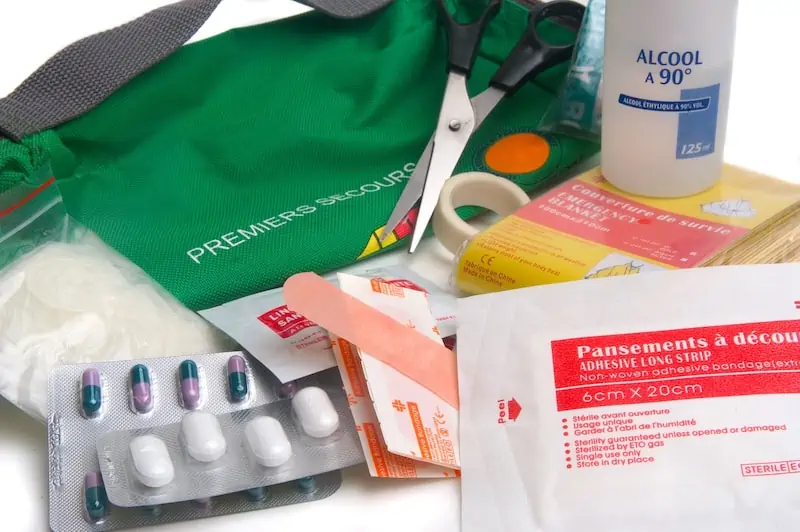
My first aid kit has Band-Aids, poison ivy cream, antibacterial cream, gauze, and large bandage pads.
36) Bear Spray
Again, if you are in a remote or woody area, be aware that bears and other predators may be around. Bear spray is more aggressive than typical pepper spray and works well to discourage bears from getting too close.
Most predatory animals will steer clear of you, but in some cases, they can charge if they feel threatened. As with the emergency supplies, bear spray adds peace of mind.
37) Find Log
I recommend keeping a find long of your treasures. This is a good way to track what you found and where you were when you found it. You may even see patterns emerging when you look overall at your log.
I like to keep a paper or GPS log when out hunting and arrange the information into an Excel spreadsheet or Word document later. Remember to log:
- Items Found
- Location
- Date of Find
- Condition of Find
- Gear Used
This will help you keep track of not only your finds, but what gear worked best for what type of find.
38) Gold Pans
If you are hunting in an area known to have gold, I recommend taking along some gold pans.
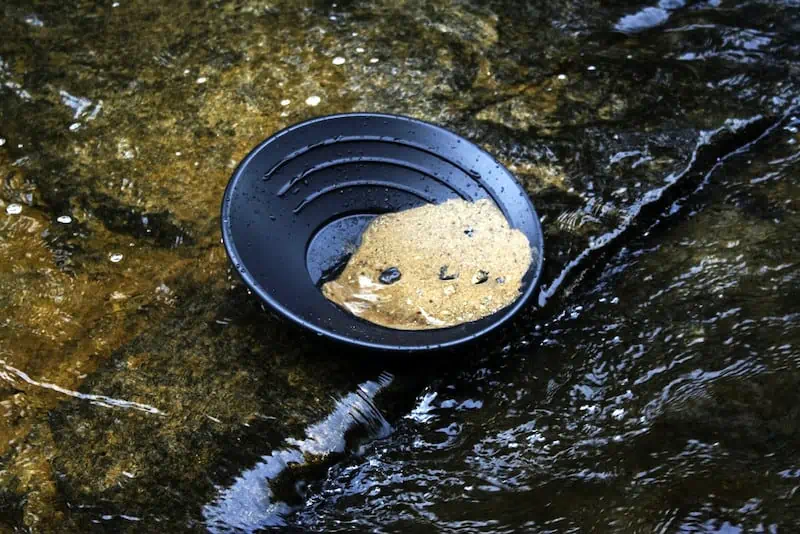
If you have a gold-specific metal detector and find a target in the water, a pan can help you dig out the target and separate it from the rocks and sand easier.
39) Snifter Bottle
If you do end up with some gold in your pan, a snifter bottle will suck it right out of the pan and keep it safely inside. I take a couple of bottles so once a piece of gold is inside the shifter, I can take the top off and put a cap on it to keep the gold inside safe.
40) Acid Test Kit
While hunting in your town, this item is not necessary as your finds can be taken home. But when in a remote area like the woods, sometimes you want to test a find right away to see what it is definitively.
I keep an acid test kit stored in my pack. It tests for silver, gold, and platinum. Some metals read a lot alike on a metal detector and more information is needed to identify it. My family and I found some native silver last summer and it looked identical to aluminum.
However, it read silver on the metal detectors and when tested with the acid kit, came back as silver. We did this the first night of our camping trip and were able to find and gather a whole bunch more silver because we knew what it was.
Conclusion
Each of these items can make your metal detecting trip easier and more fruitful. Be aware you certainly don’t need to take all these items on every single trip. I find that when metal detecting near my home, I take only a few items.
When driving hours to a wooded campsite or neighboring state, I take along all the gear I can pack. I hope this list helps some of you find amazing treasure!
- If you enjoyed this article, please “like” our Facebook page!
